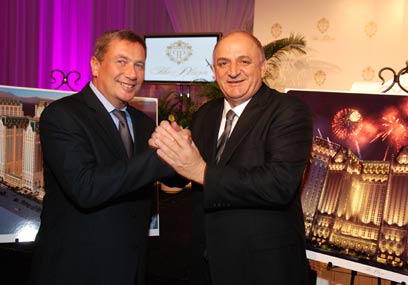All of his cash cows are giving a lot less cash than previous years and many have become dogs that are weighing down on the group's results, not in one particular sector but rather having an across-the-board effect impacting on all of the sectors in which the Group conducts business.
The numbers say it all: IDB Holdings posted a NIS 1.3 billion ($340 million) semi-annual loss as compared with a NIS 554 million ($145 million) gain for 2010 attributed mainly to the consolidation of the reports of the Group's food retail chain Shufersal as of last year.
In the real estate market, the Group's subsidiary PBC Corporation ended the first nine months of 2011 on a NIS 314 million ($83 million) loss as compared with a NIS 117 million ($31 million) loss in the same period last year.
The company sustained a heavy blow from the slowdown in the housing real estate market as well as from speculations regarding the future of the real estate market under the regulatory changes.
PBC was IDB's dividend cow in the past; however, a sagging bottom line slashes dividends for distribution. Moreover, if things continue on the same track IDB will be able to distribute dividends only if it makes an upward revaluation of its real estate property.
IDB's insurance arm – Clal Insurance – fell behind NIS 97 million ($26 million) in the first three quarters of 2011 as compared with a NIS 492 million ($130 million) gain in the same period last year.
The downturn stems mainly from the current atmosphere on the Israeli capital market which directly bears on the performance of the insurance market and investment houses.
Social protest erodes Shufersal's results
Another link in IDB's subsidiary chain which was heavily hammered is Koor Industries. The company posted a NIS 3.43 billion ($910 million) loss for the first three quarters of the year as compared with a NIS 117 million ($31 million) loss in the same period in 2010.
Koor struggled with a negative momentum generated by its acquisition of the Credit Suisse shares; nevertheless, the company announced it had recently acquired another 2.52 million shares from the bank for NIS 200 million ($53 million) in addition to the NIS 203 million ($54 million) in Credit Suisse shares it already owns.
In the communications sector, reforms introduced by Communications Minister Moshe Kahlon – reduced connectivity fees, reduced exit penalties and reduced communication package prices – toppled Cellcom's results from NIS 972 million ($257 million) to NIS 749 million ($198 million) or 24%.
And if that were not enough, the new competition on the market might bite off even more of the cellular providers' profit margins.

With Yitzhak Tshuva in better days
Another of Dankner's forte which has lost altitude from the beginning of the year is the food retail chain Shufersal. The company, which is already on the shelf with potential buyers at a 40% premium, is encumbered by a decline in real terms of the consumer's shopping cart.
Last summer's social protest impacted on Shufersal's results: in the first nine months of 2011, the chain posted a NIS 169 million ($45 million) profit as compared with a NIS 246 million ($65 million) profit in the same period in the previous year.
Forecasts are skeptic as far as the chain's prospects of increasing profits in light of the ongoing consumer boycott proven extremely effective against the retail chains.
In the meanwhile, only Clal Industries is swimming steadily upstream thanks to capital gains from its subsidiary Clal Biotechnology having sold its stake in MediWound and CureTech.
The company posted a NIS 263 million ($70 million) profit for the first nine months of the year as compared with NIS 128 million ($34 million) in the same period last year.
An overview of IDB Group shows that the loss of robustness is reflected in the ongoing erosion of its equity capital. Between 2003 and 2005 the Group's equity capital hovered around NIS 2 billion mark ($530 million); in 2007 it rose to NIS 2.5 billion ($660 million) but plummeted by 50% in 2008.
The year 2009 saw the start of ongoing erosion of the company's equity capital to a mere NIS 209 million in end of the first half of 2011.
Based on the results of the Group's subsidiaries, it is only natural that IDB's third quarter results will post a negative equity capital. On the other hand, it should be mentioned that the sale of Makhteshim Agan will beef up IDB Holding's equity capital by NIS 303-359 million ($80-95 million) and Koor's equity capital by NIS 655-747 million ($173-197 million).
Las Vegas dream shattered
One image investors will remember for long is Nochi Dankner and Yitzhak Tshuva wearing red hardhats and beaming at the cameras when they concluded the acquisition of the land for the Las Vegas project in 2007.
But four years later, PBC Group reports expose once again Dankner and Tshuva's utter defeat in Las Vegas which added to a stupendous $550 million aggregated write-off (some NIS 2 billion), which did not seem to stop PCB from releasing a market presentation under the slogan, "The power in stability".
The real estate company concluded the third quarter with a heavy NIS 427 million ($113 million) loss as compared with a NIS 46 million ($12 million) gain in the same quarter last year.
The company's revenue dropped to NIS 270 million ($71 million) as compared with a NIS 320 million ($85 million) revenue in last year's third quarter due mainly to a sharp 67% decline in flat sales. The company's operational loss for the quarter was NIS 400 million ($105 million).
The lion's portion of the quarterly losses stem from a NIS 390 million ($103 million) write-off of the three Las Vegas project: the Plaza project alone wrote off NIS 279 million ($74 million) and the GW and the QT projects in which only three units were sold since the beginning of 2010, wrote off a total NIS 110 million ($29 million).
From the beginning of the year, the company posted a NIS 314 million ($83 million) loss after the contribution form the revaluation of the HSBC building in the first half.
Excluding the HSBC revaluation, the company's loss for the first nine months amounts to nearly a half a billion shekels which did not prevent the company's directorate from distributing NIS 94 million ($25 million) in dividends last September, leaving the company with a distributable profit balance of only NIS 28 million ($7.5 million).
The overall deduction for the project's partners amounted to $300 million. The land was acquired in 2007 for $1.24 billion by Dankner (IDB Development – 25% and PBC – 25%) and Tshuva (privately-held Elad Group – 50%) who funded the deal with $620 million in equity capital and another identical sum was obtained by a non-recourse loan from a 13-bank consortium.
Already in mid-2008 speculations arose as regards the fair value of the land in light of its precipitous price and negative momentum sweeping over Vegas at the time: funding prices were up, real estate projects were put on ice, demand dropped, casino revenues were down and most of the active companies in Vegas reported heavy losses in gambling revenue.
Nonetheless, Dankner, Tshuva and their entourage displayed confidence in the project's potential and even revaluated the land at $1.5 billion.
On December 2010, the land was adjusted downwards to one billion dollars but even then the market thought it was overvalued since similar projects were having difficulties getting funding and it was becoming clear that the project was about to be put off.
Will duo sell Plaza?
PBC's Q3 results reveal another deduction on the land's value to about $300 million through changing the accounting method. Yet this is not the final word on the matter – the reports state that "the company had learned that the valuations available to the project's financing bodies set a much lower value than the present valuation."
Sources on the market indicate that the banks valuations are for just $200-$400 million – 65% less than the price it was purchased for.
Under these circumstances along with the fact that the company is scheduled to repay its debt in just nine months (August 2012), the company's accountants added a going concern warning to the company holding the Plaza project, which estimates that Tshuva and Dankner will have to write off their investment in the near future and return the property to the bank consortium.
Meanwhile, PBC stated in its reports that it plans to hire consultants to assist with negotiations with the lenders.
With so much uncertainty regarding the outcome of the talks and in light of the debt payment looming ahead, the Plaza project company included notes in its financial reports delineating the main doubts regarding the company's status as a going concern.
If the 2011 reports include a going concern warning as well, this will provide the grounds for immediate payment of the debt. If the project is continues, construction is scheduled to start in 2014 at the earliest and not in 2011 as the company initially planned, and will end towards 2017.
Click here to read this report in Hebrew
















